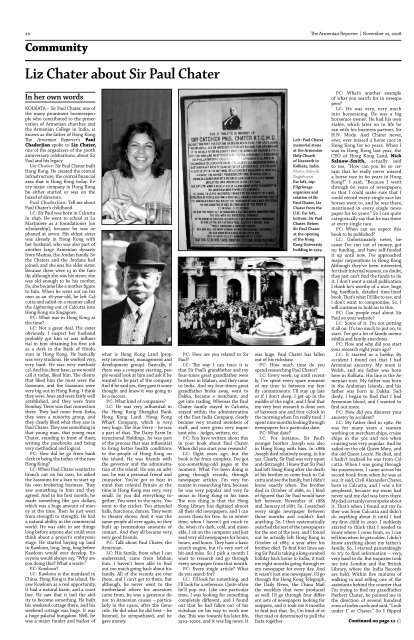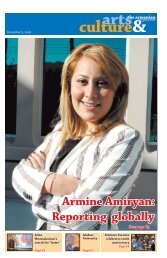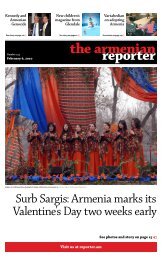And for this we are thankful.... - Armenian Reporter
And for this we are thankful.... - Armenian Reporter
And for this we are thankful.... - Armenian Reporter
Create successful ePaper yourself
Turn your PDF publications into a flip-book with our unique Google optimized e-Paper software.
10 The <strong>Armenian</strong> <strong>Reporter</strong> | November 22, 2008CommunityLiz Chater about Sir Paul ChaterIn her own wordsKOLKATA – Sir Paul Chater, one ofthe many prominent businesspeoplewho contributed to the preservationof <strong>Armenian</strong> churches andthe <strong>Armenian</strong> College in India, isknown as the father of Hong Kong.The <strong>Armenian</strong> <strong>Reporter</strong>’s PaulChaderjian spoke to Liz Chater,one of the organizers of the 300thanniversary celebrations, about SirPaul and his legacy.Liz Chater: Sir Paul Chater builtHong Kong. He created the centralinfrastructure, the central financial<strong>are</strong>a that is Hong Kong today. Everymajor company in Hong Konghe either started or was on theboard of directors.Paul Chaderjian: Tell me aboutPaul Chater’s childhood.LC: Sir Paul was born in Calcuttain 1846. He <strong>we</strong>nt to school at LaMartiniere as a foundationer [onscholarship], because he was orphanedat seven. His eldest sisterwas already in Hong Kong withher husband, who was also part ofanother large <strong>Armenian</strong> dynastyfrom Madras, the Jordan family. Sothe Chaters and the Jordans hadjoined, and she was his older sister.Because there <strong>we</strong>re 13 in the family,although she was his sister, shewas old enough to be his mother.So, she became like a mother figureto him. When he <strong>we</strong>nt out on hisown as an 18-year-old, he left Calcuttaand sailed on a steamer calledthe Lightening out of Calcutta intoHong Kong via Singapore.PC: What was in Hong Kong atthe time?LC: Not a great deal. His sisterobviously. I suspect her husbandprobably got him or was influentialin him obtaining his first jobas a clerk in the Bank of Hindustanin Hong Kong. He basicallywas very studious. He worked very,very hard. He was very methodical.<strong>And</strong> his client base, as <strong>we</strong> wouldcall it today, liked him. The clientsthat liked him the most <strong>we</strong>re theSassouns, and the Sassouns <strong>we</strong>revery big out in Hong Kong. I thinkthey <strong>we</strong>re Jews and <strong>we</strong>re fairly <strong>we</strong>llestablished, and they <strong>we</strong>re fromBombay. There was that connectionthere. They had come from India,they <strong>we</strong>re a minority group, andthey clearly liked what they saw inPaul Chater. They saw something inthat young man, that young manChater, standing in front of them,writing the passbooks and beingvery methodical and logical.PC: How did he go from bankclerk to being the father of the newHong Kong?LC: When Paul Chater wanted tobranch out on his own, he askedthe Sassouns <strong>for</strong> a loan to start uphis own brokering business. Theysaw something in him and theyagreed. <strong>And</strong> in his first month, hemade something like 500 dollars,which was a huge amount of moneyat the time. Then he just <strong>we</strong>ntfrom strength to strength. He hada natural ability in the commercialworld. He was able to see thingslong be<strong>for</strong>e anyone else could eventhink about a project’s embryonicstage. He started buying up landin Kawloon, long, long, long be<strong>for</strong>eKawloon would ever develop. Everyonewould always say, “Why <strong>are</strong>you doing <strong>this</strong>? What a waste.”PC: Kowloon?LC: Kawloon is the mainland inChina. Hong Kong is the island. Hesaw Kowloon as a real opportunity.It had a natural basin, and a coastline. He saw that it had the abilityto become something. He buil<strong>this</strong> <strong>we</strong>ekend cottage there, and his<strong>we</strong>ekend cottage was huge. It wasa huge palatial bungalow. Well, hewas a major funder and backer ofwhat is Hong Kong Land [propertyinvestment, management anddevelopment group]. Basically, ifthere was a company starting, peoplewould look at him and ask if hewanted to be part of the company.<strong>And</strong> if he said yes, they gave it somethought and knew it was going tobe a success.PC: What kind of companies?LC: He was very influential inthe Hong Kong Shanghai Bank.Hong Kong Land. Hong KongWharf Company, which is very,very huge. The Star Ferry – he wasa part of that. The Dairy Farm InternationalHoldings, he was partof the process that was influentialto bring better health conditionsto the people of Hong Kong onthe island. He was friends withthe governor and the administrationof the island. He was an advisor;he was a personal friend andcounselor. You’ve got to bear inmind that colonial Britain at thetime in Hong Kong was very, verysmall. So you did everything together.You <strong>we</strong>nt to the races. You<strong>we</strong>nt to the cricket. You attendedballs, functions, dances. They <strong>we</strong>ntto theater shows. <strong>And</strong> it was thesame people all over again, so theybuilt up tremendous amounts ofcontact. <strong>And</strong> they all became very,very good friends.PC: Talk about Paul Chater, the<strong>Armenian</strong>.LC: His family, from what I canunderstand, came from Isfahan,Iran. I haven’t been able to findout too much going back about hisfamily. All of the records <strong>are</strong> overthere, and I can’t get to them. Butalthough, he never <strong>we</strong>nt to themotherland where his ancestorscame from, he was a generous donorto <strong>Armenian</strong> causes – particularlyin the 1920s, after the Genocide.He did what he did best – helistened, he sympathized, and hegave money.PC: How <strong>are</strong> you related to SirPaul?LC: The way I can trace it isthat Sir Paul’s grandfather and myfour-times great grandfather <strong>we</strong>rebrothers in Isfahan, and they cameto India. <strong>And</strong> my four-times greatgrandfather broke away, <strong>we</strong>nt toDakka, became a merchant, andgot into trading. Whereas the PaulChater family stayed in Calcutta,stayed within the administrationof the East India Company, clearlybecame very trusted members ofstaff, and <strong>we</strong>re given very importantjobs – judges, writers, etc.PC: You have written about <strong>this</strong>in your book about Paul Chater.When did you start your research?LC: Eight years ago, but thebook is far from complete. I’ve got500-something-odd pages at themoment. What I’ve been doing isgoing through records, throughnewspaper articles. I’m very <strong>for</strong>tunatein researching him, becausehe was very popular and very famousin Hong Kong in his time.The nice thing is that the HongKong Library has digitized almostall their old newspapers, and I canaccess them <strong>for</strong> free. So in wintertime,when I haven’t got much todo, when it’s dark, cold, and miserable,I sit on the computer and justread very old newspapers <strong>for</strong> hours,hours, and hours. They have a basicsearch engine, but it’s very sort ofhit-and-miss. So I pick a month Iwant to research and go throughevery newspaper from that month.PC: Every single article? Whatdo you search <strong>for</strong>?LC: I’ll look <strong>for</strong> something, andI’ll look <strong>for</strong> a reference. Quite oftenhe’ll pop out. Like one particulartime, I was looking <strong>for</strong> somethingcompletely different, and I foundout that he had fallen out of hisrickshaw on his way to work oneday. This was towards his later life,1919–1920s, and it was big news. ItLeft: Paul Chatermemorial stoneat the <strong>Armenian</strong>Holy Churchof Naz<strong>are</strong>th inKolkata, India.Photo: SebouhBaghdoyan.Far left, top:Pilgrimageorganizer andrelation of SirPaul Chater, LizChater from theU.K. Far left,bottom: Sir PaulChater. Below:Sir Paul Chaterat the openingof the HongKong Universitybuilding in 1919.was huge. Paul Chater has fallenout of his rickshaw.PC: How much time do youspend researching Paul Chater?LC: Every <strong>we</strong>ek, up until recently,I’ve spent every sp<strong>are</strong> momentof my time in bet<strong>we</strong>en my familycommitments. I’ll stay up lateor if I don’t sleep, I get up in themiddle of the night, and I find thatmy very best research is done sortof bet<strong>we</strong>en one and four o’clock inthe morning when I’m really tired. Ispent nine months looking throughnewspapers <strong>for</strong> a particular date.PC: What date?LC: For instance, Sir Paul’syounger brother Joseph was alsoin Hong Kong with him. In 1886Joseph died relatively young, in his30s. Clearly, Sir Paul was very upsetand distraught. I knew that Sir Paulhad left Hong Kong after the deathof his brother to come back to Calcuttaand see the family, but I didn’tknow exactly when. The brotherdied in October of 1886, so I kindof figured that Sir Paul would haveleft bet<strong>we</strong>en November of 1886and January of 1887. So, I searchedevery single newspaper bet<strong>we</strong>enthose months and couldn’t findanything. So, I then systematicallysearched the rest of the newspapers<strong>for</strong> the rest of the year, and I foundout he actually left Hong Kong inOctober of 1887, a year after hisbrother died. To find four lines sayingSir Paul is taking a long-awaitedholiday back home to India, it tookme eight months going through everynewspaper <strong>for</strong> every day. <strong>And</strong>it wasn’t just one newspaper. I’d gothrough the Hong Kong Telegraph,the Daily News, the China Mail,the <strong>we</strong>eklies that <strong>we</strong>re producedas <strong>we</strong>ll. I’d go through four differentsets of newspapers looking <strong>for</strong>snippets, and it took me 8 monthsto find just that. So, I’m kind of eithermad or determined to pull thefacts together.PC: What’s another exampleof what you search <strong>for</strong> in newspapers?LC: He was very, very muchinto horseracing. He was a bighorserace owner. He had his ownstable, which later on in life heran with his business partner, SirH.N. Mody. <strong>And</strong> Chater never,ever, ever missed a horse race inHong Kong <strong>for</strong> 60 years. When Iwas in Hong Kong last year, theCEO of Hong Kong Land, NickSalnow-Smith, actually saidto me, “How can you be so certainthat he really never misseda horse race in 60 years in HongKong?” I said, “Because I <strong>we</strong>ntthrough 60 years of newspapers,so that I could make sure that Icould record every single race hishorses <strong>we</strong>nt to, and he was there,mentioned in every single newspaper<strong>for</strong> 60 years.” So I can quitecategorically say that he was thereat every single race.PC: When can <strong>we</strong> expect <strong>this</strong>book to be published?LC: Un<strong>for</strong>tunately never, becauseI’ve run out of money, gotno funding, and have self-fundedit up until now. I’ve approachedmajor corporations in Hong Kong.Although they’ve been interested,<strong>for</strong> their internal reasons, no doubt,they just can’t find the funds to doit. I don’t want a small publication.I think he’s worthy of a nice, huge,big hardback, detailed time-linedbook. That’s what I’d like to see, andI don’t want to compromise. So, Iwill continue to hold on to <strong>this</strong>.PC: Can people read about SirPaul on your <strong>we</strong>bsite?LC: Some of it. I’m not puttingit all on. It’s too much to put on, tostart. I’ve got a lot of family memorabiliaand family anecdotes.PC: How and why did you startyour research eight years ago?LC: It started as a hobby. Byaccident I found out that I had<strong>Armenian</strong> ancestry. My mum isWelsh, and my father was bornhere in Kolkata. His line is the <strong>Armenian</strong>root. My father was bornin the <strong>And</strong>aman Islands, and hisfather was born in Dakka. Suddenly,I began to find that I had<strong>Armenian</strong> blood, and I wanted tofind out more.PC: How did you discover yourancestry by accident?LC: My father died in 1982. Hewas <strong>for</strong> many years a seamanworking on merchant ships, cruiseships in the 50s and 60s whencruising was very popular. <strong>And</strong> hesailed on the old Queen Mary, andthe old Queen Leezie. He died, andI hadn’t realized he was from Calcutta.When I was going throughhis possessions, I came across hisrecord book from when he was atsea. It said, Civil Alexander Chater,born in Calcutta, and I was a bitperplexed, because my mum hadnever said my dad was born there.My dad certainly never spoke aboutit. That’s when I found out my fatherwas from Calcutta and didn’tdo anything about it until I hadmy first child in 2000. I suddenlystarted to think that I needed toknow where I come from, so I cantell him when he gets older. I didn’tknow anything about my father’sfamily. So, I started painstakinglyto try to find in<strong>for</strong>mation – very,very hard to do. But inquiries tookme into London and the BritishLibrary, where the India Records<strong>are</strong> held. Within five minutes ofwalking in and telling one of theassistants behind the counter thatI’m trying to find my grandfatherHerbert Chater, he pointed me inthe direction of several hundredrows of index cards and said, “Lookunder C or Chater.” So I flippedContinued on page 11
















